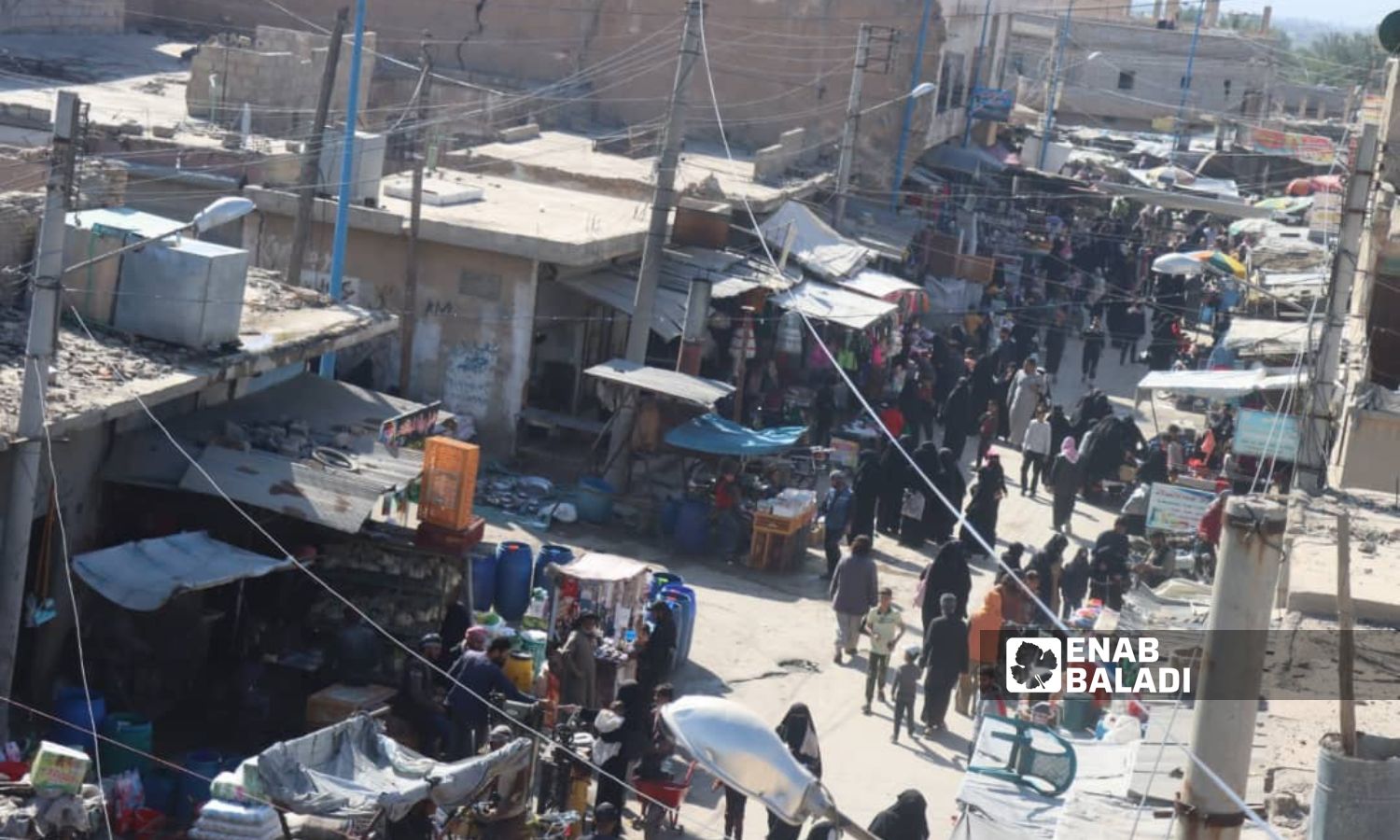



Deir Ezzor – Obadah al-Sheikh
In the city of Deir Ezzor where the Syrian regime controls, it has become usual to see children under the age of ten wandering between shops and on the streets searching for someone to give them money or food, continuing this until late at night, amidst deteriorating economic conditions and an absence of effective measures to combat this phenomenon.
Ibtisam Kanaan, a resident of the al-Qusur neighborhood in Deir Ezzor, told Enab Baladi that the phenomenon of begging has become a source of annoyance for her and others due to the numerous beggars resorting to annoying methods, especially towards girls and women.
She added that each time she leaves her house recently, she encounters children pulling her bag and holding her clothes as a form of emotional plea to prompt her to give them money.
Additionally, she noted that some try to steal phones or bags carried by girls, indicating that the concerned authorities do not intervene to stop these actions.
Abdul Hamid al-Jassem (44 years old), who works as a teacher in Deir Ezzor, said that begging has become a profession for many, as it requires no effort or capital.
He told Enab Baladi that some families send their children to the streets, markets, and popular cafes to beg and appeal for money, and the phenomenon is no longer restricted to a specific gender or age. It has become a daily sight to see children, girls, women, and elderly men spreading on sidewalks and begging.
According to city residents contacted by Enab Baladi, there are no organizations or associations specialized in providing assistance to the needy or providing any type of support for them.
Economic conditions play a role in spreading begging in the city under the control of regime forces and Iranian militias, as there are no job opportunities or projects in the city’s neighborhoods that might employ its residents.
Amira (34 years old), a mother of four children living in Deir Ezzor, told Enab Baladi that her family’s need for basic necessities has pushed her onto the streets, seeking money from passersby in the markets.
Amira (who withheld her full name for social reasons) added that her family’s financial situation deteriorated after her husband was injured by a shell in 2016, leaving him housebound and unable to work.
Having no breadwinner and finding no opportunity to secure living costs, as she holds no certificate or trade skills, she preferred going to the street to beg.
Amira said she tried hard to find cleaning work in one of the government institutions but could not secure a “recommendation” to be accepted for the job.
With time, Amira found that standing in the road and asking for money from passersby “in the name of God” was easier than falling into the hands of people who asked a lot in return for helping her get a job.
She added that some influential people in Deir Ezzor requested “sexual services” from her in exchange for helping her get a job, but she cut off communication with them.
Amira said she earns about 25,000 per day together with her nine-year-old daughter, but the amount is not enough for basic living expenses.
Enab Baladi attempted to contact people who have taken up begging in Deir Ezzor’s streets, but most refused to answer questions.
In an exclusive interview with Al Arabiya channel, UN Special Envoy for Syria, Geir Pedersen, gave a brief overview of the main unresolved issues in the Syrian file, starting with the issue of detainees and missing persons, the economic and humanitarian crisis, and the presence of about 12 million internally displaced persons.
He said, “Assad cannot determine the outcome of the conflict in Syria, nor can the Russians, Iranians, Turks, or Americans, and no one can,” considering that the situation in Syria is “extremely grim” with around 16.9 million needing humanitarian assistance and nine out of every 10 people living in poverty.
In Syria, 16.7 million people need humanitarian assistance, an increase of 9% from 2023, according to estimates by the United Nations High Commissioner for Refugees (UNHCR).
According to a statistic released on February 12 by the World Food Programme (WFP) concerning the number of people experiencing food insecurity in Syria, 80% of the Syrian population will need some form of humanitarian assistance in 2024.
About 55% of Syria’s population, or 12.9 million people, suffer from food insecurity, with 3.1 million experiencing severe food insecurity.
if you think the article contain wrong information or you have additional details Send Correction